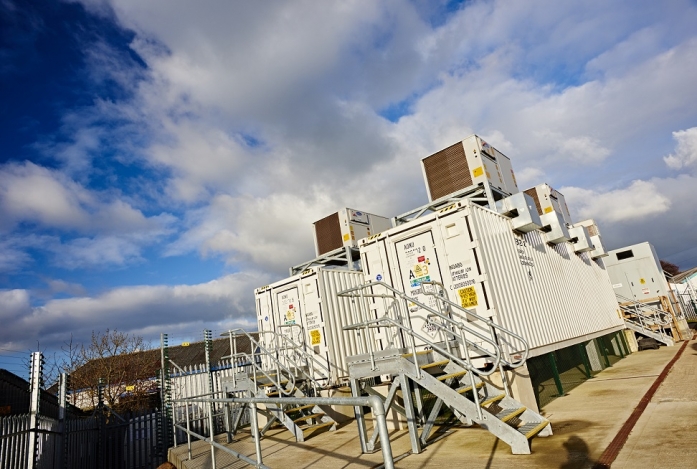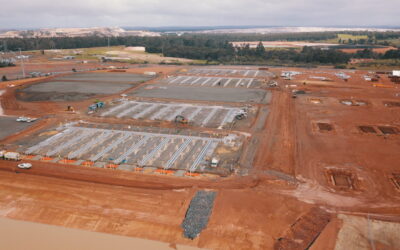
UK electrical distribution system operator Northern Powergrid has begun using a £4 million (US$5.27 million) battery paid for by consumers to sell services to National Grid, despite plans from the national regulator Ofgem to prevent distribution network operators (DNOs) from doing so in future.
The 2.5MW (5MWh) battery in Darlington has been in use since September to provide grid frequency services to the high-voltage transmission network operator (TNO) through a contract with an aggregator, Kiwi Power, drawing in some of the £1 billion spent by National Grid each year on balancing.
Enjoy 12 months of exclusive analysis
- Regular insight and analysis of the industry’s biggest developments
- In-depth interviews with the industry’s leading figures
- Annual digital subscription to the PV Tech Power journal
- Discounts on Solar Media’s portfolio of events, in-person and virtual
The six DNOs that are licensed to run the electricity distribution network in different parts of Britain are precluded from ownership or operation of energy storage due to the market distortions that could result from such activity. In July’s Smart Systems and Flexibility Plan, a strategic overview published by Ofgem and the government, the view was put forward that DNO ownership could impede the development of a competitive market for flexibility services and that such needs should be met through open tenders to the market.
Ofgem last week sought to apply new regulation with the launch of a consultation that sets out plans to introduce a new condition in the electricity distribution licence to ensure that DNOs cannot operate storage.
This will ensure that what are effectively regional monopolies are legally separate from the operation of storage facilities, regardless of whether they are required to have a generation licence.
However, the consultation also points out that some DNOs already own and operate storage assets, such as Northern Powergrid which developed the Darlington battery as part of its £31 million Customer-Led Network Revolution (CLNR) smart grid innovation project.
The project set out to test and understand the role that energy storage technology could play as part of a range of innovative smart grid solutions by providing support to Northern Powergrid’s distribution network as one of the first large scale trials of the technology.
Across all DNOs, Ofgem claims these facilities add up in total to around 12.6MW of battery storage and vary in size from 50kW to 6MW, and questions around their function and operate post trial are currently being considered.
As part of its work around storage ownership and operation, Ofgem will work with DNOs to find the most appropriate treatment of these existing storage assets on an enduring basis. Considering consumer money has already been spent on these projects, value for money will be paramount.
However, any enduring arrangements for these storage assets will not give precedent for the treatment of future storage projects by DNOs, which will have to follow the unbundling rules currently being put forward by the regulator.
There will also be some exceptions to the prohibition under the new condition for specific uses of storage by DNOs, however these relate to providing uninterruptible power supplies and emergency response rather than balancing services intended to be provided by the market.
"There is a logic for DNOs to own storage"
However, Northern Powergrid’s head of regulation and strategy Jim Cardwell told our UK-focused sister site Clean Energy News that the DNO will seek to work with Ofgem to identify further exceptions around storage.
“Through its consultation and implementation process (to summer 2018), we will be exploring with Ofgem when exceptions should be granted to its general rule, and when it would be sensible for DNOs to own and operate storage,” he said.
“We expect in the future to control many more storage and other flexible output devices. As such, the innovation purpose means what we are doing in Darlington is matched with Ofgem's general policy position.
“As well as for innovation purposes, we think there is a logic for DNOs to own limited quantities of storage if this is the right solution for customers and the market does not provide it at a sensible price.”
The most recent firm frequency response (FFR) tenders, which occur every month to provide balancing services to National Grid over varying contract lengths have seen batteries and aggregators propel the price for these services downwards.
September’s tender saw prices per MW per hour dip below £20, with Limejump securing a short contract at £16/MW/Hour. However, the aggregator also uses a battery storage facility owned by a DNO to bid into auctions after securing a deal with UKPN for the Smarter Network Storage Leighton Buzzard project. Other providers are managing to compete on a comparable level, and so it is not yet known what pricing threshold will be set before DNO storage facilities will be able to compete.
However, the new condition under consideration by Ofgem would still allow DNO storage to be owned as long as they do not operate the asset themselves. The operation would have to be carried out by a legally separate party such as an independent third party or a legally separate affiliate of the DNO, opening the door for greater participation of aggregators or SPV models for storage.
However, Northern Powergrid believes storage could continue to grow within DNOs as they transition towards a more active regional system operator role, as Melissa MacLennan, commercial development manager at Northern Powergrid, explained.
“The electricity landscape is changing rapidly with the growth of renewables, batteries and electric vehicles. This project is a significant step in our evolution into a distribution system operator (DSO) with an active role in seizing the opportunities these technologies offer to cut the cost of running the electricity system, improve its reliability and reduce its carbon footprint,” she said.
Despite this view, an Ofgem spokesperson told CEN that it will continue to discuss storage ownership and operation with DNOs to avoid market distortions in the future.
“We believe that DNOs should only be able to operate existing batteries in very limited circumstances, such as keeping vital substations on supply during outages, so as not to distort competition in flexibility markets. We will be talking to Northern Power Grid and other DNOs about the appropriate arrangements for their existing batteries funded under the Low Carbon Network Fund,” he said.
In other recent adjustments to the role of DNOs of interest to Energy-Storage.News readers, another distribution network company, UK Power Networks, has launched tenders for 34MW of flexibility and balancing services, to be awarded through competitive process in January 2018.






